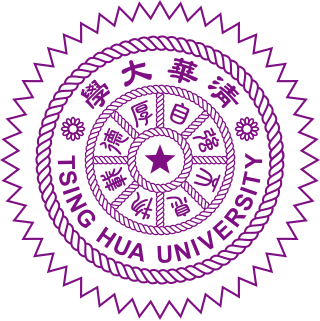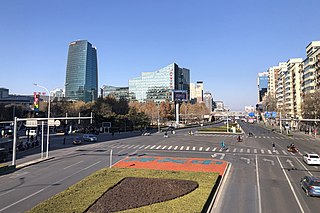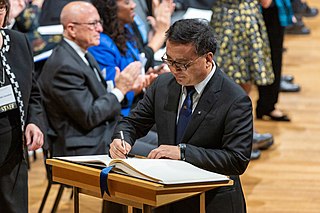Related Research Articles

Tsinghua University is a public university in Haidian, Beijing, China. It is affiliated with and funded by the Ministry of Education of China. The university is part of Project 211, Project 985, and the Double First-Class Construction. It is also a member of the C9 League.

National Tsing Hua University (NTHU) is a public research university in Hsinchu, Taiwan.

Andrew Chi-Chih Yao is a Chinese computer scientist and computational theorist. He is currently a professor and the dean of Institute for Interdisciplinary Information Sciences (IIIS) at Tsinghua University. Yao used the minimax theorem to prove what is now known as Yao's Principle.

The University of Science and Technology of China (USTC) is a public university in Baohe, China. It is affiliated with the Chinese Academy of Sciences, and co-funded by the Chinese Academy of Sciences, the Ministry of Education of China, and the Anhui Provincial Government. The university is part of Project 211, Project 985, and the Double First-Class Construction.

Zhongguancun is a major technology hub in the Haidian District, Beijing, China.
Microsoft Research (MSR) is the research subsidiary of Microsoft. It was created in 1991 by Richard Rashid, Bill Gates and Nathan Myhrvold with the intent to advance state-of-the-art computing and solve difficult world problems through technological innovation in collaboration with academic, government, and industry researchers. The Microsoft Research team has more than 1,000 computer scientists, physicists, engineers, and mathematicians, including Turing Award winners, Fields Medal winners, MacArthur Fellows, and Dijkstra Prize winners.

Simon Peyton Jones is a British computer scientist who researches the implementation and applications of functional programming languages, particularly lazy functional programming.
Chung Laung Liu, also known as David Liu or C. L. Liu, was a Taiwanese computer scientist. Born in Guangzhou, he spent his childhood in Macau. He received his B.Sc. degree in Taiwan, master's degree and doctorate in the United States.

Xuedong David Huang is a Chinese American computer scientist and technology executive who has made contributions to spoken language processing and artificial intelligence, including Azure AI Services. He is Zoom's chief technology officer after serving as Microsoft's Technical Fellow and Azure AI Chief Technology Officer for 30 years. Huang is a strong advocate of AI for Accessibility, and AI for Cultural Heritage.
Shang-Hua Teng is a Chinese-American computer scientist. He is the Seeley G. Mudd Professor of Computer Science and Mathematics at the University of Southern California. Previously, he was the chairman of the Computer Science Department at the Viterbi School of Engineering of the University of Southern California.
Heung-Yeung "Harry" Shum is a Chinese computer scientist. He was a doctoral student of Raj Reddy. He was the Executive Vice President of Artificial Intelligence & Research at Microsoft. He is known for his research on computer vision and computer graphics, and for the development of the search engine Bing.
Chandrasekaran Mohan is an Indian-born American computer scientist. He was born on 3 August 1955 in Tamil Nadu, India. After growing up there and finishing his undergraduate studies in Chennai, he moved to the United States in 1977 for graduate studies, naturalizing in 2007. In June 2020, he retired from being an IBM Fellow at the IBM Almaden Research Center after working at IBM Research for 38.5 years. Currently, he is a visiting professor at China's Tsinghua University. He is also an Honorary Advisor at the Tamil Nadu e-Governance Agency (TNeGA) in Chennai and an advisor at the Kerala Blockchain Academy in Kerala.
Zhang Hongjiang is a Chinese computer scientist and executive. He was CEO of Kingsoft, managing director of Microsoft Advanced Technology Center (ATC) and chief technology officer (CTO) of Microsoft China Research and Development Group (CRD). Hongjiang is currently Chairman of BAAI. In 2022, he was elected to the National Academy of Engineering for his technical contributions and leadership in the area of multimedia computing.

Qiang Yang is the Chair Professor, Department Head of CSE, HKUST in Hong Kong and University New Bright Professor of Engineering and Chair Professor from 2015. He was the founding head of Noah's Ark Lab. He had taught at the University of Waterloo and Simon Fraser University. His research interests are data mining and artificial intelligence.
Yunhao Liu is a Chinese computer scientist. He is the Dean of Global Innovation Exchange (GIX) at Tsinghua University.
Haitao "Heather" Zheng is Chinese-American computer scientist and electrical engineer. She is the Neubauer Professor of Computer Science at the University of Chicago. She was elected a Fellow of the Institute of Electrical and Electronics Engineers (IEEE) in 2015 for "contributions to dynamic spectrum access and cognitive radio networks". She was named to the 2022 class of ACM Fellows, "for contributions to wireless networking and mobile computing".

Yong Rui is the chief technology officer and senior vice president of Lenovo Group. He is in charge of Lenovo's technical strategy, research and development directions, and Lenovo Research, one of Lenovo's most important innovation engines.
Jin Li is a Chinese computer scientist. He joined Microsoft Research in 1999, as one of the founding member of Microsoft Research Asia. He is currently a Partner Research Manager at Microsoft Research, Redmond.

Ya-Qin Zhang is a Chinese-American scientist, technologist and business executive. He is currently a Chair Professor at Tsinghua University and the founding Dean of the Tsinghua institute for AI Industry Research (AIR).
Shixia Liu is a Chinese computer scientist whose research involves information visualization, visual methods in text mining, and the use of visual analytics in explainable artificial intelligence. She is a professor in the Tsinghua University School of Software.
References
- ↑ "Liu Tieyan, Vice President of the Microsoft Research Asia, was employed by Tsinghua University as a Part-time Professor". Tsinghua University. May 2019. Archived from the original on 4 February 2022. Retrieved 4 February 2022.
- ↑ Roach, John (8 December 2016). "Microsoft researchers earn distinctions from premier computing society". Microsoft. Archived from the original on 4 February 2022. Retrieved 4 February 2022.
- ↑ "ACM names 71 Fellows for computing advances that are driving innovation". EurekAlert. 20 January 2022. Archived from the original on 4 February 2022. Retrieved 4 February 2022.